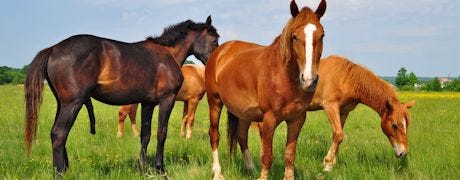July 18, 2014

Four horses in Colorado have tested positive for vesicular stomatitis, making Colorado the second state with confirmed cases. The animals are believed to be index cases and have no history of travel.
On July 17, the National Veterinary Services Laboratory reported a positive test on samples submitted from four horses. The initial Colorado disease investigation was performed by one of the field veterinarians from the State Veterinarian's Office at the Colorado Department of Agriculture. Previous positive cases of vesicular stomatitis in 2014 have been diagnosed in the southern area of Texas near the Mexico border and more recently in Bastrop and Travis counties just south of Austin, Texas.

"At this time there are no travel restrictions in Kansas. Veterinarians and horse owners are being advised to keep an eye on their animals, especially if they are traveling this summer and may be co-mingled with horses from other states," said Kansas Animal Health Commissioner Dr. Bill Brown.
Kansas Animal Health Commissioner Dr. Bill Brown noted that this information is important to horse owners and those who participate in horse related activities including youth shows and rodeos. "At this time there are no travel restrictions in Kansas. Veterinarians and horse owners are being advised to keep an eye on their animals, especially if they are traveling this summer and may be co-mingled with horses from other states."
Veterinarians and livestock owners who suspect an animal may have VS or any other vesicular disease should immediately contact State or federal animal health authorities. Livestock with clinical signs of VS are isolated until they are healed and determined to be of no further threat for disease spread. There are no USDA-approved vaccines for VS.
While rare, human cases of VS can occur, usually among those who handle infected animals. VS in humans can cause flu-like symptoms and only rarely includes lesions or blisters.
Signs and Transmission
VS-susceptible species include horses, mules, cattle, bison, sheep, goats, pigs and camelids. The clinical signs of VS include vesicles, erosions and sloughing of the skin on the muzzle, tongue, teats and above the hooves of susceptible livestock. Vesicles are usually only seen early in the course of the disease. The transmission of vesicular stomatitis is not completely understood but components include insect vectors, mechanical transmission, and livestock movement.
~~~PAGE_BREAK_HERE~~~
VS is not fatal, however blister-like lesions swell and break, leaving raw tissue. Infected animals are placed under quarantine during the diseases incubation period.
Tips for Livestock Owners:
Strict fly control is an important factor to inhibit the transmission of the disease.
Avoid transferring feeding equipment, cleaning tools or health care equipment from other herds.
Veterinarians and livestock owners should contact the state of destination when moving livestock interstate to ensure that all import requirements are met. For additional information on Kansas import requirements go to www.agriculture.ks.gov/importregs
VS disease prevention procedures include minimizing the sharing of water and feed/equipment, applying insect repellent daily (especially to the animal's ears), and closely observing animals for signs of VS.
Important Points for Veterinarians:
Any vesicular disease of livestock is reportable in Kansas. To report call 785-564-6601.
Since VS is considered a foreign animal disease, any case with clinical signs consistent with VS will warrant an investigation by a state or federal foreign animal disease diagnostician (FADD).
Because of the contagious nature of VS and its resemblance to other diseases such as foot and mouth disease, animal health officials urge livestock owners and caretakers to report these symptoms to their veterinarian immediately.
When VS is suspected, the FADD will gather the epidemiological information, take the necessary blood samples, collect the necessary fluid or tissue from the lesions, and inform the owners and the referring veterinarian as to necessary bio-security and movement restrictions.
A USDA-APHIS VS fact sheet
For current USDA-APHIS VS situation reports .
Source: Kansas Department of Agriculture
You May Also Like




